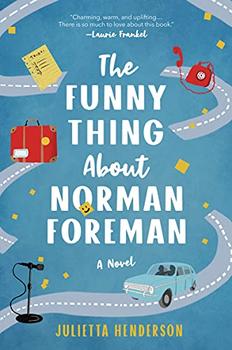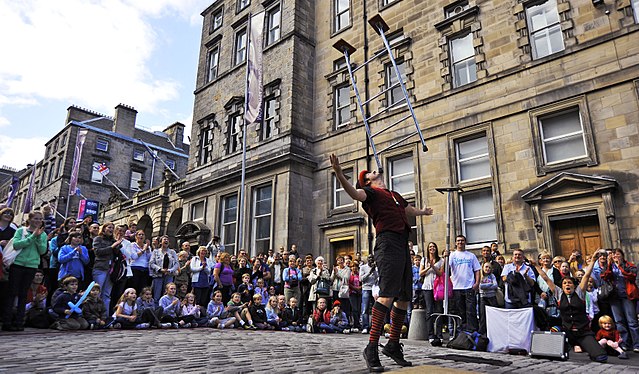Summary | Excerpt | Reviews | Beyond the Book | Read-Alikes | Genres & Themes | Author Bio

A Novel
by Julietta HendersonThis article relates to The Funny Thing About Norman Foreman
 In Julietta Henderson's The Funny Thing About Norman Foreman, the title character is a 12-year-old boy who wants to perform his stand-up comedy at the Edinburgh Festival Fringe. Also known as "the Edinburgh Fringe" or simply "the Fringe," this event started out as an unofficial offshoot of the Edinburgh International Festival in Edinburgh, Scotland. It soon became a festival in its own right and is now the largest arts festival in the world.
In Julietta Henderson's The Funny Thing About Norman Foreman, the title character is a 12-year-old boy who wants to perform his stand-up comedy at the Edinburgh Festival Fringe. Also known as "the Edinburgh Fringe" or simply "the Fringe," this event started out as an unofficial offshoot of the Edinburgh International Festival in Edinburgh, Scotland. It soon became a festival in its own right and is now the largest arts festival in the world.
When the Edinburgh International Festival of Music and Drama began in 1947, it stirred up controversy due to its substantial spending on fine arts during a period of economic strife. Britain was still struggling after World War II, and many thought the festival was out of touch with the times. Furthermore, the organizers had barred Scottish drama from being featured on the program, as they considered it to not meet the high standards of the event. In response, eight theater groups decided to set up their own performance spaces and take advantage of the festival crowds, operating on the "fringe" of the official festival. The Fringe continued alongside the International Festival in subsequent years while growing in cultural relevance and popularity.
1958 saw the formation of the Festival Fringe Society, an organization intended to support and promote the Fringe. The Society centralized the event somewhat, establishing a main box office and program, and remains behind the festival today. The organization has maintained the original spirit of the Fringe by keeping it open-access and free of directorial authority, with a policy of giving anyone who can secure a venue the opportunity to perform. This provides up-and-coming artists and entertainers with the chance to gain a wider audience.
The Edinburgh Fringe takes place over three weeks during the month of August. Today it operates out of over 300 venues all over the city. Prices for shows vary. The Free Fringe, a model started in 1996 that gathers a program of free performances, allows festival-goers the choice of attending shows at no cost and making optional donations.
As the early Fringe was based in drama, it isn't surprising that the event has helped many playwrights find success, including Tom Stoppard, whose now-famous Rosencrantz and Guildenstern Are Dead gained a wide audience due in part to a positive review of a Fringe performance by Ronald Bryden in The Observer. The festival today welcomes a variety of performance types, including dance, opera, cabaret, street shows and exhibitions, and it has become known in recent years for its significance in the world of stand-up comedy. The Fringe has kickstarted or helped boost the careers of many actors and comedians who are now household names, including Stephen Fry, Emma Thompson, Hugh Laurie, John Cleese, duo Mel Giedroyc and Sue Perkins, Graham Norton and Trevor Noah.
Since its origins with the Edinburgh Fringe, "fringe" has been adopted as a general term for alternative theater and open-access performance events. Cities all over the world have organized their own fringe festivals, with just a few examples being the Toronto Fringe Festival, the Chicago Fringe Festival and the Dublin Fringe Festival. The U.S. Association of Fringe Festivals provides resources for organizing and accessing fringe events across the United States.
High Street performance at Edinburgh Festival Fringe, 2010, courtesy of Festival Fringe Society (CC BY-SA 3.0)
Filed under Music and the Arts
![]() This "beyond the book article" relates to The Funny Thing About Norman Foreman. It originally ran in May 2021 and has been updated for the
March 2022 paperback edition.
Go to magazine.
This "beyond the book article" relates to The Funny Thing About Norman Foreman. It originally ran in May 2021 and has been updated for the
March 2022 paperback edition.
Go to magazine.
Our wisdom comes from our experience, and our experience comes from our foolishness
Click Here to find out who said this, as well as discovering other famous literary quotes!
Your guide toexceptional books
BookBrowse seeks out and recommends the best in contemporary fiction and nonfiction—books that not only engage and entertain but also deepen our understanding of ourselves and the world around us.